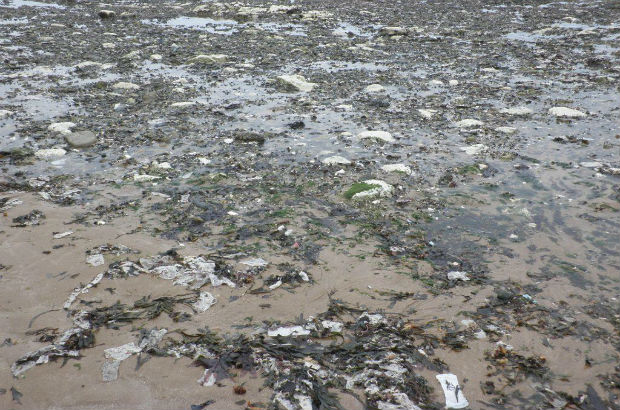
We work hard at the Environment Agency to keep water clean for people to enjoy and rivers healthy for wildlife to thrive. Did you know there are simple things you can do too?
Water UK has announced today that wet wipes are the biggest cause of sewer blockages: new proof that flushing wet wipes causes sewer blockages.
They have found that wipes make up more than 90% of the material causing sewers to block. When blockages happen, the contents of drains and toilets can end up in rivers and on beaches. That‘s very unpleasant and it causes pollution that kills fish and other wildlife – derailing years of improvements by local people, the Environment Agency and water companies. It also costs a lot of money - £100 million a year to clear blockages.
That’s why we’re supporting the water sector in their work to raise awareness of this issue and to urge people, manufacturers and retailers not to flush wet wipes and to label them as not flushable.
Flushing a wet wipe isn’t disposing of it. It’s environmental littering.
Sewage blockages can cause pollution and surface water flooding. Blockages in your pipes can also cost you to repair blocked pipes.
So please be aware that wet wipes aren’t flushable and spread the word to protect the environment.
You could share this blog or any of the good advice here:
Thames Water: Bin it - don’t block it
Anglian Water: Unflushables VIDEO
Water UK: What not to flush
At the Environment Agency we have been working with the water sector and a range of organisations including Keep Britain Tidy, Marine Conservation Society, Surfers Against Sewage and Visit England to give advice about keeping beaches clean and on what you shouldn’t put down toilets or drains. You can find out more and join the conversation using the hashtag #BinIt4Beaches


7 comments
Comment by Paul posted on
I agree, its mainly everyone that does it. It is just common sense to put it the bin also disposing pads and wipes is against the law as they are breaking 3 laws which are all related to the water and environment. There are some chemicals that are hazardous to health too that should be flushed away with cold water . 1 The Workplace (Health, Safety and Welfare) Regulations 1992
2 The Water Industries Act 1991
3 The Environmental Protection Act 1990 all protecting the environment however people are still flushing away pads in the toilet even though they have the sanitary bins provided.
It is the foreign people that are making a mess too and they do not recycle. They are a hazard to the environment and need to respect other peoples country and follow the living style.
I have seen a massive land fill in India which was mounted up with litter mainly plastic and it was a disgusting scenario.
People just find it hard to respect nature, follow rules and be civilised. All my luck to the environment.
Comment by Kim posted on
I work in health care, we use wipes daily for personal care and pay for the appropriate bins and disposal, I do hope this will not affect the industry as wipes are an effective and dignified way of undertaking personal care tasks. Other means are more hazardous to health, this needs consideration.
Wishing the government would stop focusing on issues that shouldn't be an issue if people were educated about the environment. Yes some people are either lazy or ignorant fix that issue, fine lazy people at home who flush.
Comment by Jeff James posted on
Most wet wipes are made up of 80% polyester (plastic), however it is possible to produce without any problem 100% cotton so fully biodegradable wet wipes. Why is this not being pushed? Because they are a little more expensive of course but can we put a price on such things? I should add they are still not flushable but at least they do biodegrade.
Comment by Brian Sutherland posted on
I know that this may sound a bit on the sensible side, but in stead of baning the wet wipe why not make the manufactures produce a wipe does actualy desolve in water,as just saying ban it why not change it. I seem to get feeling that if we are not carefull we will be living in a world with nothing to use (a pencil is a sharp object quick ban it, knives can be sharp ban them ). When will you realise that baning is not the answer, try the question,what is the most dangerous thing in your kitchen.
ANSWER SCROLL DOWN
A BLUNT KNIFE
a cut from a sharp knife will result with a nick in your finger
due to the amount of [resure you put on a blunt knife to make it cut it will go straight down to the bone
answer sharp knife cut = sticky plaster,,,,,,blunt knife cut= stiches in the finger, banning the sharp knife is not the answer just as banning the wet wipe not the answer,,make the wet wipe from a different material that will truely desolve in water.
Comment by Rachel B posted on
I use wet wipes daily for various things and never dispose of them down the toilet because a) I'm already aware they should not be flushed down the toilet, b) I care about the environment and c) there is a "DO NOT FLUSH" warning on the back of the packet. So people are either not reading the labels or they just simply cant be bothered to put them in the bin! Maybe one solution is to print the "DO NOT FLUSH" label on the FRONT of the packet instead of the back, stating that it is harmful to the environment if they are flushed down the loo!
Comment by Hugh Price posted on
I sail out of Whitehaven harbour, which has been polluted with ochre coloured pollution from abandoned coal mining for over 2 years now.
Nearby on the rocky shore at Parton, just a couple of miles north of Whitehaven, a similar discharge has poured out of a culvert in an old NCB concrete bunker and straight into the sea for over 50 years.
This is presumably acceptable to the Environment Agency.
Can someone please confirm that the EA regard the Parton discharge as harmless.
The problem at Whitehaven could be resolved if he incoming polluted water in the Bransty Beck (which currently discharges in the Queens Dock in the north of the harbour) could be diverted around the harbour and out into the sea.
The original course of the Bransty Beck was actually north of the harbour but in the late 1800s it was diverted into the harbour presumably because it was an inconvenience in what used to be a shipbuilding yard just north of the harbour.
Comment by alexburton posted on
Hello sir, we appreciate your concerns regarding this pollution. We would encourage you to call our incident line on 0800807060. This ensures the officers in the area are aware of the situation and then can investigate. Many thanks